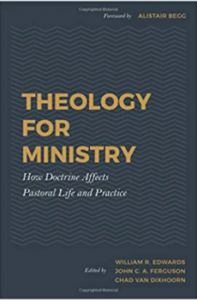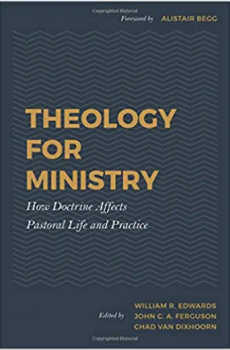
I love practical ministry books, but there can be a downside: detached from scriptural theology, they become manipulative, promoting worldly methodologies to achieve ends that are at odds with the holiness of life that God seeks for his church. Ultimately, the minister and his work must be shaped by the character of God, who has revealed himself in the scriptures of the Old and New Testaments. True, a minister must understand the needs of his church and community as he pursues his work. But every plan must also be brought to the touchstone of Scripture and tested for its biblical fidelity. To that end, pastors will find Theology for Ministry: How Doctrine Affects Pastoral Life and Practice a most helpful book.
Theology for Ministry is both the book’s title and the burden of the volume’s articles. Twenty-six contributors – all of whom have pastoral experience – insist that shepherding practice must rest securely on a theological foundation derived from the doctrines of God’s word. How fitting that their work honors pastor-theologian Sinclair Ferguson. For more than five decades, Ferguson’s books, lectures, and sermons have mined the scriptures, demonstrating how sound doctrine shapes pastoral life and practice. Each contributor comments briefly on the influence Ferguson has had on his life and/or ministry.
While the book is not a commentary on the Westminster Confession of Faith, the doctrines covered do come, for the most part, in the order they appear in the confession (Scripture, Trinity, the decrees of God, creation, providence, etc.). This arrangement proves beneficial for professors like me, who are persuaded that the Westminster Confession of Faith (along with the Larger and Shorter Catechisms) is among the most valuable instruments in the pastor’s toolbox. Throughout, contributors interact with the Westminster Standards.
Theology for Ministry is now a required text in my introductory pastoral ministry class. Following are several areas that I look forward to discussing with my students.
